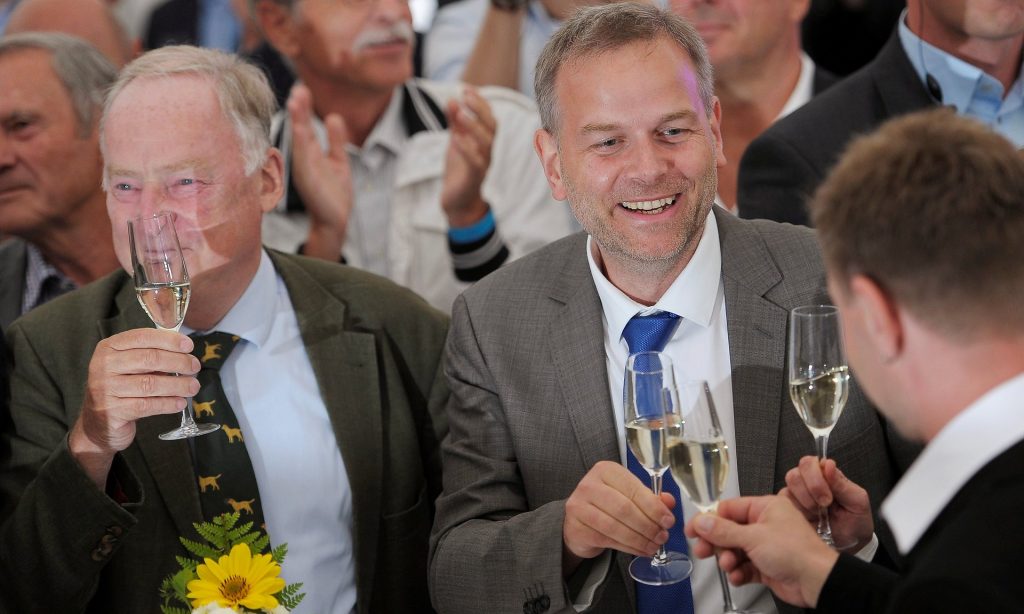
Photograph: Stefanie Loos/Reuters
Angela Merkel has suffered a sobering defeat in regional elections in her constituency of Mecklenburg-Vorpommern, with her Christian Democratic Union (CDU) coming third behind the Social Democrats (SPD) and the rightwing populists Alternative für Deutschland (AfD).
Projections late on Sunday night saw the centre-left SPD on 30.5%, the anti-immigration AfD on 20.9%, and the chancellor’s centre-right CDU suffering its all-time lowest result in the eastern state, on 19%. Earlier this year, the CDU had looked like the party most likely to be tasked with forming the next government in the state.
For the past 10 years, Mecklenburg-Vorpommern has been governed in a “grand coalition” between the SPD and CDU, mirroring the current power structure at federal level. But an increasingly divisive debate over the consequences of the German government’s strategy during the refugee crisis has spurred support for AfD – fronted in the state by Leif-Erik Holm, a radio presenter based in Berlin’s multicultural Prenzlauer Berg district – even though the state has been largely insulated from the refugee crisis.
Though the result will not have a direct impact on the workings of the German government, and Mecklenburg-Vorpommern only has a population of 1.6 million, it has a symbolic value, with regional elections in Berlin on 18 September and a general election coming up next year. Merkel, in power since 2005, has yet to confirm whether she will run for a fourth term in 2017.
While the Social Democrats emerged as the largest party on the night and the results for the Christian Democrats were particularly humiliating, leftwing parties in the state also suffered considerable losses. The Left party was projected to have won 13.2%, down from 18.4% five years ago, while the pro-environment Greens seemed set to win 4.9%, down from 8.7%. The far-right National Democratic party (NPD), which has been represented in the state parliament for the last 10 years, fell beneath the 5% threshold for the first time in a decade, on 3.1%.
AfD, by contrast, continued a remarkable streak of electoral victories at regional level. Three years after being founded on an anti-euro ticket in 2013, it is now represented in nine state parliaments. Its co-leader, Frauke Petry, described Sunday’s result as a blow to Angela Merkel. “Now it is our responsibility to make politics for the people. The people no longer trust the old establishment parties to do so,” Petry said.
On Sunday night, CDU candidate Lorenz Caffier said: “There was only one subject during the campaign, and that subject was the refugee policy. The refugee question was decisive.” The conservative politician ruled out a resignation and said he hoped his party would be able to continue to form the state’s coalition government.
Peter Tauber, the CDU’s general secretary, described the outcome as “a bitter result, a new experience”. “We are all responsible for this,” Tauber said. “It was noticeable that the refugee subject was very present. Of course many people are looking at Angela Merkel.”
The state election in Mecklenburg-Vorpommern comes a year to the day after Merkel’s government accepted thousands of refugees stranded at Budapest train station – the consequences of which have been analysed across the German media in the past fortnight.
In May, a pig’s head carrying an insulting message was left outside Merkel’s constituency office in the Baltic Sea town of Stralsund, where she has won a direct mandate since 1990.
AfD candidate Holm spoke of a proud result for a young party. “The icing on the cake is that we have left Merkel’s CDU behind us,” he said. “Maybe that is the beginning of the end of Merkel’s time as chancellor.”
Gero Neugebauer, a political scientist at Berlin’s Free University, sounded a similar warning for Merkel. “People will see this as the start of the ‘Kanzlerdämmerung’ [twilight of the chancellor],” he said. “If a lot of CDU members start seeing this defeat as Merkel’s fault, and members of parliament start seeing her as a danger for the party and their own jobs, the whole situation could escalate out of control.”
The northernmost of the five former East German states that joined with the West German federal republic in 1990, Mecklenburg-Vorpommern has in the past been troubled by industrial decline and a dwindling population but last year registered the lowest unemployment rate and highest GDP since reunification.
An electoral map of Sunday’s election shows a state split between an SPD-voting west, where incomes are higher due to its proximity to affluent Hamburg, and the east, where many electoral districts went to the AfD.
In part due to its economic weakness and low population density, the region was assigned fewer refugees than all but two of Germany’s 16 other Länder; 23,080 asylum seekers were registered in Mecklenburg-Vorpommern in 2015, roughly a quarter of those assigned to similarly sized Hesse. Only 3.7% of the state’s population is of non-German background, one of the lowest rates in the country.
In the past year, the state has registered no high-profile criminal incidents, such as terrorist attacks or rape, carried out by asylum seekers, and a decline in theft and violent crime. Police in Mecklenburg-Vorpommern recorded seven incidents of attempted arson at refugee shelters in 2015.
A shooting rampage in Munich and two attacks with an Islamist motive in regional towns in Bavaria in July have fostered a national debate about internal security. Caffier was one of the politicians behind a call for a ban on the full face veil in Germany last month.

